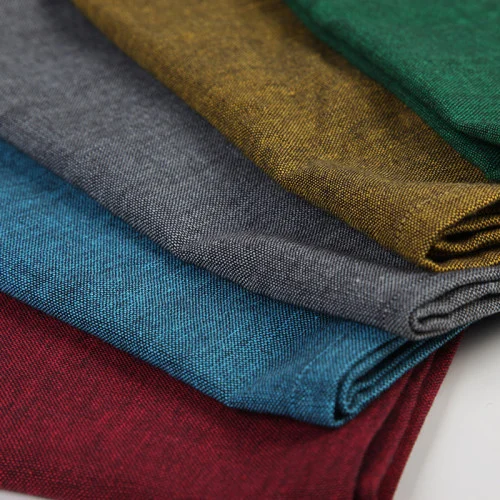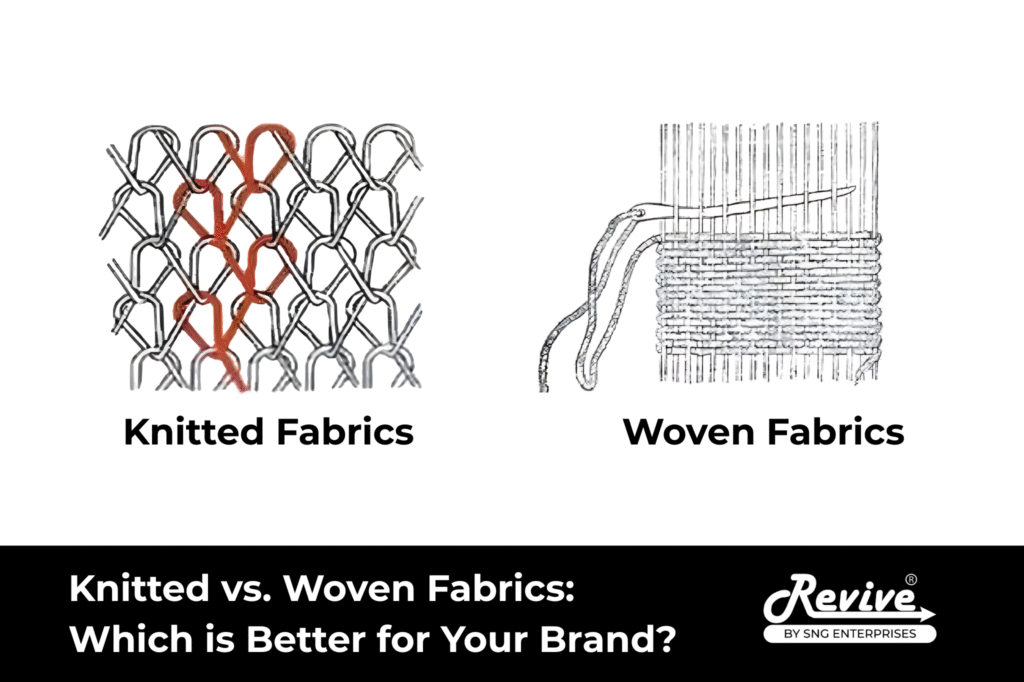When building a successful fashion brand, one of the most important decisions you’ll make is choosing the right fabric. The look, feel, durability, and sustainability of your clothing all depend on this choice. For most buyers, the big question comes down to knitted vs. woven fabrics.
Both have unique strengths, but the right option depends on your product line, target customers, and long-term sourcing strategy. In this guide, we’ll break down the differences between knitted and woven fabrics, highlight their applications in the fashion industry, and explain why many brands in India and abroad are increasingly choosing knitted fabrics.

What Are Knitted Fabrics?
Knitted fabrics are made by interlooping yarns, giving them a natural stretch and flexibility. This structure makes them soft, comfortable, and breathable—qualities that are highly valued in modern fashion.
Common Knitted Fabrics:
- Single Jersey Fabric (India) – Lightweight, smooth, and ideal for T-shirts, casualwear, and innerwear.
- Rib Fabric (supplied in Punjab) – Stretchable, durable, and often used for cuffs, collars, and fitted clothing.
- Interlock Fabric (India) – Thicker, more stable, and perfect for premium tops, dresses, and activewear.
At Revive by SNG Enterprises, knitted fabrics are our specialty. From organic cotton fabric India options to high-quality interlock and rib fabrics, our knitted fabric collection is designed to meet the needs of fashion brands seeking both performance and sustainability.

What Are Woven Fabrics?
Woven fabrics are produced by interlacing two sets of yarns at right angles. This structure makes them firm, less elastic, and more durable in certain applications. They are widely used for structured garments, uniforms, and upholstery.
Common Woven Fabrics:
- Denim – Popular for jeans and jackets.
- Twill – Strong and durable, often used for trousers and workwear.
- Poplin – Lightweight and crisp, perfect for shirts and formal wear.
While woven fabrics are essential in specific industries, fashion brands increasingly prioritize knitted fabrics for casualwear, athleisure, and sustainable clothing lines.
Knitted vs. Woven Fabrics: Key Differences
Here’s a quick comparison to help you understand how knitted fabrics differ from woven fabrics:
| Feature | Knitted Fabrics | Woven Fabrics |
| Structure | Made by interlooping yarns | Made by interlacing yarns |
| Stretchability | Naturally stretchable, comfortable | Rigid, limited stretch unless elastane is added |
| Comfort | Soft, breathable, ideal for daily wear | Firm, structured, better for formal wear |
| Durability | Flexible, resists wrinkling | Strong, long-lasting but less flexible |
| Applications | T-shirts, innerwear, athleisure, dresses | Jeans, trousers, uniforms, shirts |
| Sustainability | Often produced in organic cotton fabric India variants | Heavier production footprint in many cases |
| Cost-effectiveness | Lower production waste, easy to customize | Higher costs in some applications |
Why Fashion Brands Prefer Knitted Fabrics in 2025–2026
The fashion industry has shifted significantly in recent years. Consumer demand for comfort, sustainability, and versatility has made knitted fabrics the go-to choice for many brands.
1. Athleisure and Casualwear Growth
Consumers want clothing that transitions from home to work to leisure. Knitted fabrics like single jersey and rib fabrics offer unmatched comfort.
2. Sustainable Sourcing in India
There’s a growing demand for organic cotton fabric India, and knitted fabric suppliers in Ludhiana and Punjab are leading the way in eco-friendly production.
3. Cost and Production Efficiency
Knitted fabrics are easier to cut, stitch, and customize, reducing turnaround times for brands following fast fashion trends.
4. Versatility in Design
From T-shirts to dresses, knitted fabrics work across categories, unlike woven fabrics which are more limited to structured wea
Fabric Sourcing for Fashion Brands in India
If you’re sourcing fabrics for your brand, choosing the right suppliers is as important as choosing the right material.
- Fabric Wholesalers in India offer both knitted and woven fabrics, but quality can vary widely.
- Cotton Fabric Ludhiana and bulk fabric suppliers Punjab are known globally for their reliable production.
- For brands focused on comfort and sustainability, Revive by SNG Enterprises knitted fabrics Ludhiana provides consistent quality across single jersey, rib, and interlock fabrics.
How Revive by SNG Enterprises Supports Fashion Brands
As one of the leading fabric suppliers in Punjab, Revive by SNG Enterprises specializes in knitted fabrics India with a focus on:
- Single Jersey Fabric: Lightweight, versatile, perfect for casualwear.
- Rib Fabrics: Durable, stretchable, widely used in cuffs and waistbands.
- Interlock Fabrics: Stable, soft, ideal for premium apparel.
- Sustainability: From organic cotton fabric India to eco-friendly dyeing, our production aligns with global standards.
Whether you’re sourcing for domestic needs or looking for bulk fabric suppliers Punjab for exports, Revive delivers quality that fashion brands trust.
Contact us at +91 98724-32426 for inquiries.
Conclusion
Both knitted and woven fabrics have their place in the fashion industry. Woven fabrics are great for structured, formal garments like trousers and uniforms. But for brands focusing on casualwear, athleisure, and sustainable clothing, knitted fabrics are the clear winner.
With consumer demand leaning toward comfort and eco-friendly sourcing, fashion brands in India and abroad are increasingly partnering with trusted knitted fabric suppliers like Revive by SNG Enterprises.
Explore Knitted Fabrics Collection to discover high-quality single jersey, rib, and interlock fabrics tailored for your brand.
FAQs: Knitted vs. Woven Fabrics
1. Which fabric is more durable: knitted or woven?
Woven fabrics are more rigid and durable for structured garments, but knitted fabrics are more flexible and resistant to wrinkling, making them durable for daily wear.
2. Is cotton fabric knitted or woven?
Cotton can be both knitted and woven. At Revive by SNG Enterprises, we specialize in cotton knitted fabrics India such as single jersey, rib, and interlock.
3. Why do fashion brands prefer knitted fabrics in India?
Knitted fabrics offer comfort, breathability, and sustainability—key demands in modern fashion. They are also easier to source in bulk from fabric wholesalers in Punjab and Ludhiana.
4. Are knitted fabrics more sustainable than woven fabrics?
Knitted fabrics often use less energy in production and are available in organic cotton variants, making them a sustainable choice for eco-conscious brands.
5. Where can I source bulk knitted fabrics in Ludhiana?
You can source from Revive by SNG Enterprises, one of the leading knitted fabrics Ludhiana suppliers, offering bulk solutions for B2B buyers.
6. What is single jersey fabric used for?
Single jersey is a lightweight knitted fabric commonly used for T-shirts, tops, and casualwear. Revive by SNG Enterprises offers premium single jersey fabric across India.
7. How do I choose between knitted and woven fabrics for my brand?
If your brand focuses on casualwear, activewear, or sustainable fashion, knitted fabrics are ideal. For structured formalwear, woven fabrics may be better. Many brands use a mix depending on their product range.
Author Bio
Written by: Sambhav Gupta
Sambhav Gupta is a Partner at SNG Enterprises and co-founder of Revive by SNG, where he plays a key role in driving growth, product development, and strategic partnerships. With a strong focus on sustainability and innovation, Sambhav is passionate about expanding SNG’s global footprint and offering fabrics that balance quality, scalability, and environmental responsibility.




